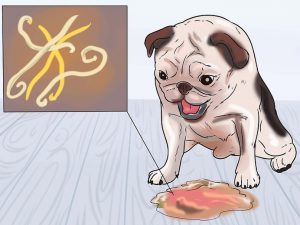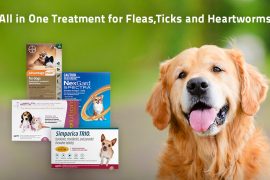If you want to know about what bothers your dog so much that he is unable to digest the food he loves, you should get into the depth about worms.
Worms are parasites that invade your pet’s stomach and intestines, feed off them and make them weak and infectious. There are different types of worms that reside in your pooch’s stomach and intestines. Today, the topic of discussion is going to be on roundworms.
Roundworms, also known as ascarids, are the annoying and lethal parasites that threaten the dog’s well-being. You can recognize them as they look like spaghetti, few inches long and generally white or light brown in color. They suck away the nutrients from the intestinal walls of the pets.
Roundworms are a common infection that can be spread by an infected mother to a newly born pup. The eggs or larvae of the parasite is not usually visible to the naked eyes and can be accidentally ingested by the canines when outside like in the parks or on a walk. It can also be ingested from other infected species.

The varied symptoms that gives you clue about the presence of roundworms in your furry pal’s body are:
- Diarrhea
- Weakness
- Vomiting
- Loss of weight
- Presence of worms in vomits or feces
- Pot belly
Best Ways To Get Rid of Roundworms
Veterinarians suggest roundworm treatments after a fecal examination of the dog’s stool that confirms their existence. The general medications and treatments that are recommended by the vets are Antezole Paste and Liquid Oral, Cazitel Plus Tablets, Droncit, Drontal, Endogard, Mediworm, Panacur Oral Paste and Popantel.
De-worming pups is a necessary task because they commonly are infected from their birth and it is safe for the pups as well. Even if your dog has been de-wormed you should take him for regular vet checkups or annual check-ups to confirm his intestinal health is proper and unharmed.
There are certain preventative techniques that one must adhere to ensure complete safety of the dogs. Few points are:
- Start de-worming the puppies at a young age. The de-worming must be carried out at regular intervals, depending on the pet’s age.
- Ensure proper cleanliness in the house, especially in the places where he eats, plays and sleeps.
- The litter box must be immaculate with no room for infections.
- Provide proper preventative medications and treatments.
- Consult your vet on how to prevent worms from occurring and infecting the dog by a balanced diet and effective treatments.
A clean home is a disease-free home.





